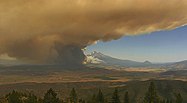
Back Uitwerking van klimaatsverandering Afrikaans تبعات الاحتباس الحراري Arabic জলবায়ু পরিবর্তনের প্রভাব Bengali/Bangla Efectes de l'escalfament global Catalan Dopady globálního oteplování Czech Effeithiau newid hinsawdd Welsh Folgen der globalen Erwärmung German Επιπτώσεις της κλιματικής αλλαγής Greek Efectos del calentamiento global Spanish Klima aldaketaren ondorioak Basque
Effects of climate change are well documented and growing for Earth's natural environment and human societies. Changes to the climate system include an overall warming trend, changes to precipitation patterns, and more extreme weather. As the climate changes it impacts the natural environment with effects such as more intense forest fires, thawing permafrost, and desertification. These changes can profoundly impact ecosystems and societies, and can become irreversible once tipping points are crossed.
The effects of climate change vary in timing and location. Up until now the Arctic has warmed faster than most other regions due to climate change feedbacks.[1] Surface air temperatures over land have also increased at about twice the rate they do over the ocean, causing intense heat waves. These temperatures would stabilize if greenhouse gas emissions were brought under control. Ice sheets and oceans absorb the vast majority of excess heat in the atmosphere, delaying effects there but causing them to accelerate and then continue after surface temperatures stabilize. Sea level rise is a particular long term concern as a result. The effects of ocean warming also include deoxygenation from marine heatwaves, ocean stratification, and changes to ocean currents.[2]: 10 The ocean is also acidifying as it absorbs carbon dioxide from the atmosphere.[3]

The ecosystems most immediately threatened by climate change are in the mountains, coral reefs, and the Arctic. Excess heat is causing environmental changes in those locations that exceed the ability of animals to adapt.[8] Species are escaping heat by migrating towards the poles and to higher ground when they can.[9] Sea level rise threatens coastal wetlands with flooding. Decreases in soil moisture in certain locations can cause desertification and damage ecosystems like the Amazon Rainforest.[10]: 9 At 2 °C (3.6 °F) of warming, around 10% of species on land would become critically endangered.[11]: 259
Humans are vulnerable to climate change in many ways. Sources of food and fresh water can be threatened by environmental changes. Human health can be impacted by weather extremes or by ripple effects like the spread of infectious diseases. Economic impacts include changes to agriculture, fisheries, forestry, and tourism. Outdoor labor may not be possible many more days out of the year due to heat stress. Island nations and coastal cities may be inundated by rising sea levels. Some groups of people may be particularly at risk from climate change, such as the poor, children, and indigenous peoples. Industrialised countries, which have emitted the vast majority of CO2, have more resources to adapt to global warming than developing nations do.[12] Cumulative effects and extreme weather events can lead to displacement and migration.[13]
- ^ Lindsey, Rebecca; Dahlman, Luann (28 June 2022). "Climate Change: Global Temperature". climate.gov. National Oceanic and Atmospheric Administration. Archived from the original on 17 September 2022.
- ^ a b Intergovernmental Panel on Climate Change (IPCC), ed. (2022), "Summary for Policymakers", The Ocean and Cryosphere in a Changing Climate: Special Report of the Intergovernmental Panel on Climate Change, Cambridge: Cambridge University Press, pp. 3–36, doi:10.1017/9781009157964.001, ISBN 978-1-009-15796-4, retrieved 24 April 2023
- ^ Doney, Scott C.; Busch, D. Shallin; Cooley, Sarah R.; Kroeker, Kristy J. (17 October 2020). "The Impacts of Ocean Acidification on Marine Ecosystems and Reliant Human Communities". Annual Review of Environment and Resources. 45 (1): 83–112. doi:10.1146/annurev-environ-012320-083019. ISSN 1543-5938. S2CID 225741986.
- ^ "The Causes of Climate Change". climate.nasa.gov. NASA. Archived from the original on 21 December 2019.
- ^ "Climate Science Special Report / Fourth National Climate Assessment (NCA4), Volume I". science2017.globalchange.gov. U.S. Global Change Research Program. Archived from the original on 14 December 2019.
- ^ "Extreme Weather and Climate Change". NASA.gov. National Aeronautics and Space Administration. September 2023. Archived from the original on 26 October 2023.
- ^ "The Study of Earth as an Integrated System". nasa.gov. NASA. 2016. Archived from the original on 2 November 2016.
- ^ EPA (19 January 2017). "Climate Impacts on Ecosystems". Archived from the original on 27 January 2018. Retrieved 5 February 2019.
Mountain and arctic ecosystems and species are particularly sensitive to climate change... As ocean temperatures warm and the acidity of the ocean increases, bleaching and coral die-offs are likely to become more frequent.
- ^ Cite error: The named reference
:8was invoked but never defined (see the help page). - ^ IPCC, 2019: Summary for Policymakers. In: Climate Change and Land: an IPCC special report on climate change, desertification, land degradation, sustainable land management, food security, and greenhouse gas fluxes in terrestrial ecosystems [P.R. Shukla, J. Skea, E. Calvo Buendia, V. Masson-Delmotte, H.- O. Pörtner, D. C. Roberts, P. Zhai, R. Slade, S. Connors, R. van Diemen, M. Ferrat, E. Haughey, S. Luz, S. Neogi, M. Pathak, J. Petzold, J. Portugal Pereira, P. Vyas, E. Huntley, K. Kissick, M. Belkacemi, J. Malley, (eds.)]. doi:10.1017/9781009157988.001
- ^ Parmesan, Camille; Morecroft, Mike; Trisurat, Yongyut; et al. "Chapter 2: Terrestrial and Freshwater Ecosystems and their Services" (PDF). Climate Change 2022: Impacts, Adaptation and Vulnerability. The Sixth Assessment Report of the Intergovernmental Panel on Climate Change. Cambridge University Press.
- ^ Director, International (15 October 2018). "The Industries and Countries Most Vulnerable to Climate Change". International Director. Archived from the original on 2 January 2020. Retrieved 15 December 2019.
- ^ Kaczan, David J.; Orgill-Meyer, Jennifer (1 February 2020). "The impact of climate change on migration: a synthesis of recent empirical insights". Climatic Change. 158 (3): 281–300. Bibcode:2020ClCh..158..281K. doi:10.1007/s10584-019-02560-0. ISSN 1573-1480. S2CID 207988694.
© MMXXIII Rich X Search. We shall prevail. All rights reserved. Rich X Search



